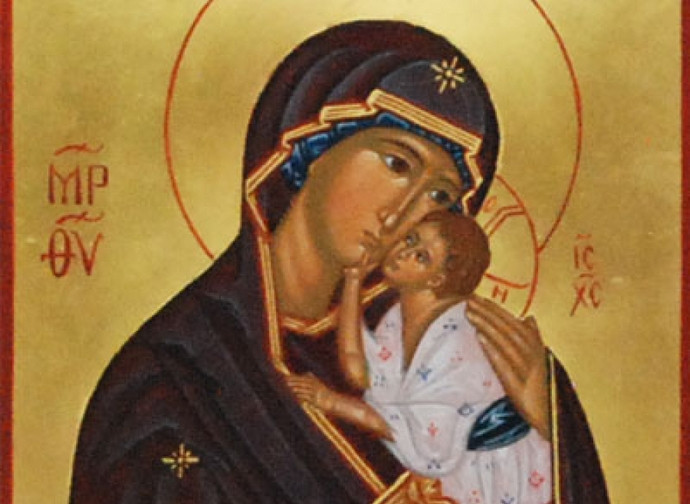Mary, the blessed one, a life in the light of the Lord
Being in the presence of God is the condition for being blessed. Like Mary, who was the first to be filled with the blessing that comes from the light that Jesus brings into the world. The Mother of God is the first to be blessed and she is the one who brings the blessing. From the homily of Pope Benedict XVI on 1 January 2012.

We publish the first part of the homily given by Pope Benedict XVI on 1 January 2012 during the Holy Mass for the Solemnity of the Blessed Virgin Mary.
Dear Brothers and Sisters!
On the first day of the year, the liturgy resounds in the Church throughout the world with the ancient priestly blessing that we heard during today’s first reading: “The Lord bless you and keep you; the Lord make his face to shine upon you, and be gracious to you; the Lord lift up his countenance upon you and give you peace” (Num 6:24-26). This blessing was entrusted by God, through Moses, to Aaron and his sons, that is, to the priests of the people of Israel. It is a triple blessing filled with light, radiating from the repetition of the name of God, the Lord, and from the image of his face. In fact, in order to be blessed, we have to stand in God’s presence, take his Name upon us and remain in the cone of light that issues from his Face, in a space lit up by his gaze, diffusing grace and peace.
This was the very experience that the shepherds of Bethlehem had, who reappear in today’s Gospel. They had the experience of standing in God’s presence, they received his blessing not in the hall of a majestic palace, in the presence of a great sovereign, but in a stable, before a “babe lying in a manger” (Lk 2:16). From this child, a new light issues forth, shining in the darkness of the night, as we can see in so many paintings depicting Christ’s Nativity. Henceforth, it is from him that blessing comes, from his name – Jesus, meaning “God saves” – and from his human face, in which God, the almighty Lord of heaven and earth, chose to become incarnate, concealing his glory under the veil of our flesh, so as to reveal fully to us his goodness (cf. Tit 3:4).
The first to be swept up by this blessing was Mary the virgin, the spouse of Joseph, chosen by God from the first moment of her existence to be the mother of his incarnate Son. She is the “blessed among women” (Lk 1:42) – in the words of Saint Elizabeth’s greeting. Her whole life was spent in the light of the Lord, within the radius of his name and of the face of God incarnate in Jesus, the “blessed fruit of her womb”. This is how Luke’s Gospel presents her to us: fully intent upon guarding and meditating in her heart upon everything concerning her son Jesus (cf. Lk 2:19, 51). The mystery of her divine motherhood that we celebrate today contains in superabundant measure the gift of grace that all human motherhood bears within it, so much so that the fruitfulness of the womb has always been associated with God’s blessing. The Mother of God is the first of the blessed, and it is she who bears the blessing; she is the woman who received Jesus into herself and brought him forth for the whole human family. In the words of the liturgy: “without losing the glory of virginity, [she] brought forth into the world the eternal light, Jesus Christ our Lord” (Preface I of the Blessed Virgin Mary).
Mary is the mother and model of the Church, who receives the divine Word in faith and offers herself to God as the “good soil” in which he can continue to accomplish his mystery of salvation. The Church also participates in the mystery of divine motherhood, through preaching, which sows the seed of the Gospel throughout the world, and through the sacraments, which communicate grace and divine life to men. The Church exercises her motherhood especially in the sacrament of Baptism, when she generates God’s children from water and the Holy Spirit, who cries out in each of them: “Abba, Father!” (Gal 4:6). Like Mary, the Church is the mediator of God’s blessing for the world: she receives it in receiving Jesus and she transmits it in bearing Jesus. He is the mercy and the peace that the world, of itself, cannot give, and which it needs always, at least as much as bread.
Dear friends, peace, in the fullest and highest sense, is the sum and synthesis of all blessings. So when two friends meet, they greet one another, wishing each other peace. The Church too, on the first day of the year, invokes this supreme good in a special way; she does so, like the Virgin Mary, by revealing Jesus to all, for as Saint Paul says, “He is our peace” (Eph 2:14), and at the same time the “way” by which individuals and peoples can reach this goal to which we all aspire.
